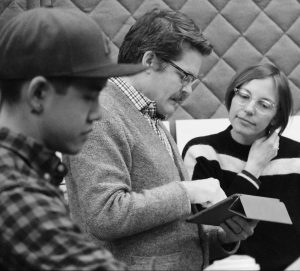
Enjoy this “Backstory Bonus” interview between TimeLine Artistic Director PJ Powers (PJP) and playwright Anna Ziegler (AZ):
(PJP) Can you share how this play began for you?
(AZ) I was interested in writing about gender, and I discovered a Rolling Stone article online by John Colapinto about David Reimer. It was so compelling and strange and sad. I pitched the story to the Sloan Foundation’s play-commissioning arm and happily, got the commission.
I’d say the rest is history, but that might also imply some level of effortlessness, which would be misleading. This play has been the most difficult to write of all of my plays. It took me a long time to find this story.
(PJP) We have talked before about how terrifying parenting can be, aware of the harm that can be done by imposing things on a child. How did this perspective inform your approach to the play?
(AZ) From the beginning, I had enormous empathy for the parents in the play. I felt they were just trying to do their best in an impossible situation—impossible because of the limits of science at the time, and impossible because these parents simply were not equipped, with resources or with knowledge, to deal with what happened to their child.
After becoming a parent myself, I gained a deeper understanding of the pain and guilt these parents must have felt every single day of their lives, how even the slightest possibility that you might be complicit in your child’s unhappiness must feel almost unforgivable. I also have a much more complex appreciation of just how tricky love is. How our children torture us in countless ways and yet we love them anyway, in some ways even more fiercely the more difficult they are.
(PJP) The first play of yours I ever read was Photograph 51, which is about the pioneering 20th century scientist Rosalind Franklin. In that play, Franklin is the central character, surrounded by other characters named for real-life scientists. But your approach to Boy was different. You created your own characters, departing somewhat from the story that inspired the play. Can you talk about why you chose that route?
(AZ) The premise of Boy is inspired by the Reimer story, but the rest is fiction. That said, it wasn’t always. When I first started writing this piece, my aim was to stay closer to the original story. I also felt the play wanted to be as much if not more about the doctor who treated David. I was really interested in him—why he was attracted to this case and what in his life led him to this moment. The doctor’s mother was even a major character!

In that draft, the doctor seemed purely in it for his own gain, despite my attempts to humanize him, and Adam was pretty blandly a victim of the doctor’s interventions. I kept feeling, every time I would hear it aloud, that it was dramatically inert, that there was no moral ambiguity, nothing for an audience to come away with and discuss. It occurred to me that maybe the key to the play lay in creating a more complicated, fraught relationship between doctor and patient, and also in thinking of this squarely as Adam’s play, not the doctor’s.
Those two decisions changed everything—now every scene was about Adam, and at the heart of the story was the thorny matter of the affection between Adam and the doctor.
I liked the idea that Dr. Barnes was of course interested in Adam’s case as it pertained to science, but that he also loved this child, as a father would a daughter. And so it was love, as opposed to ambition, that blinded him, just as it did Adam’s parents, to what was right in front of him: this child and who he really was.
Ultimately, the departures from the Reimer story felt necessary to me—both in terms of finding the drama in the story, the conflict, and also as a way to get at what I was most interested in: writing a play about the failures of love, the mistakes that can be made despite, or perhaps because of, the best intentions.
(PJP) Boy explores so many provocative topics— gender identity, the examination of nature vs. nurture, medical ethics and more—but at its core I would call it a love story. Would you agree?
(AZ) Definitely. And on many levels. A love story between Adam and Jenny. A love story between Adam and his parents, and between Adam and Wendell, the doctor. Most importantly, perhaps, it’s the love story of Adam with Adam.
(PJP) Boy has a really fascinating structure, jumping back and forth in time. I love that it keeps the audience wondering throughout about the missing pieces of the story that aren’t yet revealed. How much tinkering have you done, or did you know from the outset that you wanted this back-and-forth, somewhat mysterious structure?
(AZ) I landed on this structure when I decided that the play would be Adam’s story, the puzzle that is his life (as much a puzzle for him to piece together as it is for the audience). I think it metaphorically and theatrically recreates or mirrors Adam’s experience. He cannot escape his past.
(PJP) Since the play covers 1968 through 1990, we’ve had to continually remind ourselves that the “modern” portion of the play is still 28 years ago, and much has changed in terms of public awareness about the issues explored in the play. Why do you think it has particular resonance now?
(AZ) I think the question of what makes us who we are is a timeless one. But I think the play resonates now for the obvious reason that it raises questions about gender in a moment when gender is in the spotlight. It asks whether we have any real say in who we become, or if we are who we are from the moment we are born. And if we are who we are from the moment we are born, then there is less room to question anyone who does not feel inside like the gender that their body presents.
I’ve heard people say—though I will admit that this wasn’t my intention in writing it—that the play can serve as an introduction to gender dysphoria for those who cannot conceive of what it might feel like to live in a body that doesn’t reflect who you feel you are.
